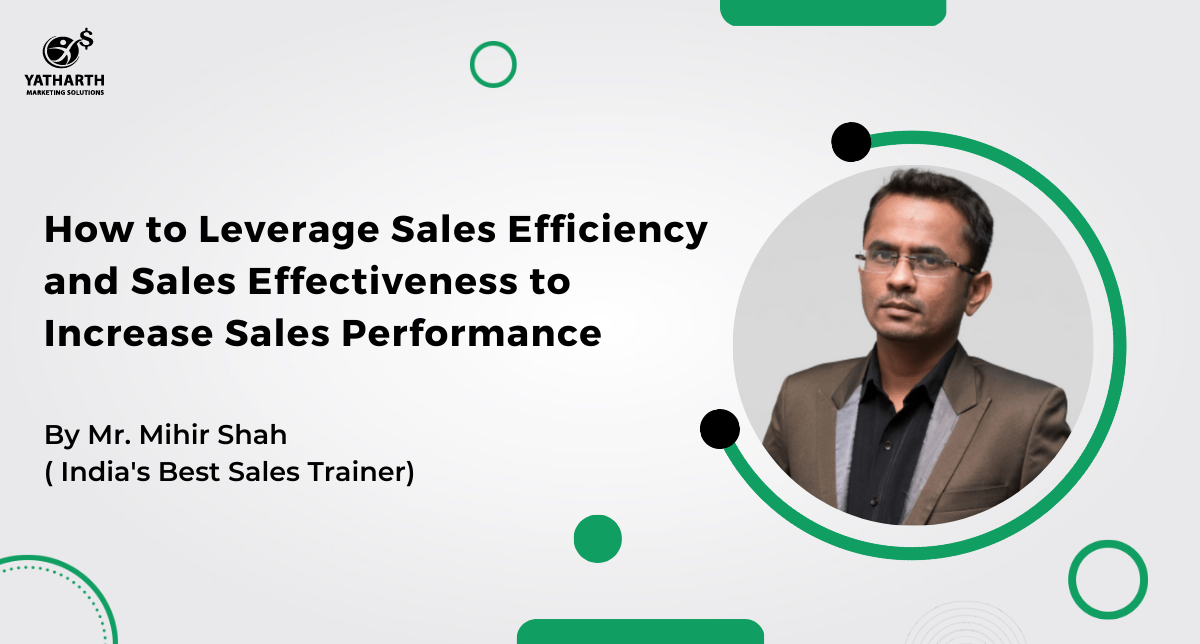Sales effectiveness can be simply defined as your sales team’s ability to complete the tasks and work towards the same goal. On the other hand, Sales Efficiency is how these tasks are completed. It means the ability to complete sales without doing much wastage and proper utilization of resources.
Both of these are important for the growth of your business. If you want to boost the sales figures of your business, this article is for you.
Know about Sales Efficiency
Sales efficiency refers to the ability of a sales team to maximize its output (i.e., revenue generated) while minimizing the resources (i.e., time, money, and effort) used to achieve it. Sales efficiency is critical for businesses because it enables sales teams to generate maximum revenue while minimizing costs and resources. It helps businesses operate more efficiently and increase their profitability.
By streamlining processes, automating tasks, and utilizing technology and tools, sales teams can be more productive and achieve their targets more effectively. In today’s competitive business environment, sales efficiency is a key differentiator that can give companies an edge over their rivals.
Steps for Improving Sales Efficiency
- Identify the goals and objectives of the sales team.
- Evaluate the current sales process and identify areas for improvement.
- Automate and streamline repetitive tasks to save time and effort.
- Provide sales training programs and coaching to improve productivity and efficiency.
- Utilize technology and tools to increase efficiency, such as CRM software and sales analytics.
- Measure and track key performance indicators (KPIs) to identify areas for further improvement.
- Continuously review and refine the process to optimize efficiency and effectiveness.
Know about Sales Effectiveness
Sales effectiveness is the ability to close the deals. It can also mean the ability to reach the desired goals of sales and generating revenue. Sales effectiveness encompasses the sales team’s ability to comprehend customers’ requirements and pain points, foster strong relationships, and communicate the product or service’s value proposition in a convincing manner.
Achieving sales effectiveness necessitates sales representatives to have a thorough grasp of the sales process, the product or service they are marketing, and the industry they operate in.
By prioritizing sales effectiveness, sales teams can not only boost deal-closing rates but also foster customer loyalty and encourage repeat business. This is a pivotal element in driving overall sales performance and revenue growth.
Steps for Improving Sales Effectiveness
- Gain an in-depth understanding of the target market and customer needs.
- Craft a compelling value proposition that sets the product or service apart from competitors.
- Invest in ongoing sales training programs provided by a reputed sales training company and coaching to enhance sales skills and techniques.
- Build strong relationships with customers through effective communication and relationship-building strategies.
- Leverage data and analytics to identify areas for improvement and track key performance metrics.
- Continuously refine the sales process & sales training programs to optimize efficiency and effectiveness.
- Emphasize a customer-centric approach that prioritizes the needs and preferences of the customer.
- Utilize technology and tools, such as CRM software, sales automation, and sales analytics, to increase effectiveness.
How Both Work Together?
Sales efficiency and sales effectiveness work together to improve overall sales performance.
- Sales efficiency optimizes resources for maximum revenue, while effectiveness focuses on understanding and meeting customer needs for long-term loyalty and repeat business.
- Improving sales efficiency can allow sales teams to focus on building relationships and meeting customer needs, while improving sales effectiveness can reduce the time and resources required to close deals.
- For example, learning how automating administrative tasks through sales training programs can free up time for customer-facing activities, while understanding customer needs can lead to more targeted sales strategies and faster deal-closing, ultimately increasing revenue and efficiency.
Conclusion
In conclusion, Both are two critical components of a successful sales strategy. Sales efficiency focuses on maximizing revenue and optimizing resources, while sales effectiveness focuses on understanding customer needs and building relationships to generate long-term loyalty and repeat business.
By improving both efficiency and effectiveness and working with a sales training company, sales teams can increase revenue, reduce costs, and create a strong foundation for sustained business growth.
By following the steps outlined in this blog, such as gaining an in-depth understanding of the target market, investing in sales training and coaching, and leveraging data and analytics, sales teams can improve both efficiency and effectiveness, ultimately driving overall sales performance and revenue growth



